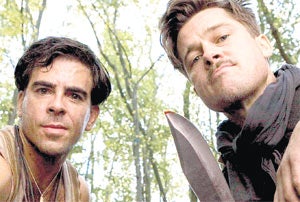Inglourious Basterds (18)
Dog soldiers

Quentin Tarantino returns to public notice with a Second World War movie, though be warned, it bears about as much relation to historical realism as did To Be or Not To Be or Where Eagles Dare, both of which it passingly recalls. Inglourious Basterds is more like a fantasia of a war movie, a gleefully unstable compound of violence and comedy and talk, backed up with quotations from all the movies Tarantino used to watch when he might have been having a life instead. It serves as an enjoyable reminder of why we sat up and noticed him in the first place.
Its magpie approach highlights what a deeply eccentric artist Tarantino continues to be. No modern film-maker has paid such an obsessive tribute to genre while subverting it at the same time. Ever since he burst on the scene with Reservoir Dogs, a heist movie that dispensed with the heist, QT has gone his own sweet way about remodelling old forms in new guises. So it is with his latest, which takes a delight in wrong- footing expectations from the first scene. It is a long and surprisingly tense set-piece between a French farmer and a Nazi colonel, Hans Landa (Christoph Waltz), who suspects him of hiding a Jewish family. Their talk, which slips between English and French, is a superb exercise in charm-as-intimidation, with the Nazi – nicknamed, ominously, "The Jew Hunter" – toying with his prey like a cat with a mouse. The slow build-up of threat, and the focus upon apparently innocent details, are of a standard to rank alongside Alfred Hitchcock: look out for the glass of milk and its sinister reappearance in a later scene.
If the accomplishment of this first scene were upheld throughout then we might have a masterpiece on our hands. Alas, it is uneven as well as unpredictable. For one thing, the bad guy turns out to be so much more interesting than the good guys, a squad of Jewish-American soldiers whose reputation as murderous "basterds" allegedly strikes fear into the Nazis.
The squad leader, Lieutenant Aldo Raine (Brad Pitt), has instructed his men to deliver 100 Nazi scalps a piece, and the summary retribution they mete out to the enemy is scarcely less brutal than Colonel Landa's modus operandi. Pitt, sticking out his jaw, has fun with this Tennessee toughnut, but all the time he's on screen you keep thinking how much better a job the Austrian actor Christoph Waltz does as his opposite number. The Cannes jury thought so, too, and gave Waltz the best actor award. Yet Tarantino does not even have the two of them meet until the very end; instead he introduces several other major characters, including a Jewish fugitive (Mélanie Laurent) hiding out as a Parisian cinema owner. She is being courted by a German war hero (Daniel Brühl), who himself is a protégé of Joseph Goebbels, the Nazi propaganda minister. Adolf Hitler himself also makes an appearance, though more in the manner of a Mel Brooks film than a rival to Bruno Ganz.
And if that sounds freaky, how about the scene in which a British officer, Hicox, is briefed on an undercover mission. Nothing wrong with Michael Fassbender's clipped George Sanders impersonation as Hicox, but you may do a double-take on spotting Winston Churchill in the corner of the room and a general, plummily played by Mike Myers. This in turn sets up the film's other thrilling set-piece, a meeting in a Parisian cellar bar between Hicox, a film-star double agent (Diane Kruger) and a Gestapo major (August Diehl). Once again, the dialogue is taut with implication, its prowling menace oddly inflected by the game of names-on-the-forehead the company play at the table. Hicox's gestural mistake that gives him away to the Nazi may remind you of Gordon Jackson's fatal error at the bus stop in The Great Escape, but even if it doesn't there are plenty more nods and winks to spot: this is a virtual echo chamber of movie references, from the films of Leni Riefenstahl and G W Pabst to the musical borrowings from Ennio Morricone and David Bowie's "Cat People". Its maverick, guys-together spirit also brings to mind war movies of the Sixties and Seventies like The Dirty Dozen, The Big Red One and Sam Peckinpah's Cross of Iron.
Indeed, so pervasive is the film influence that Tarantino sets the whole denouement in a fancy Art Deco cinema, where a propaganda war movie is being screened for the Reich elite. The flagrant rewriting of history amounts to an admission that Tarantino prefers to tell stories that derive from cinema rather than life. It would be a bit late to complain about this – it has been a hallmark of his career – but I think it does preclude him from the high plains of film-making greatness. There is much to enjoy in Inglourious Basterds, from the performances of Christoph Waltz and Michael Fassbender to the wonderful confidence of those long talky scenes. Even with its propensity for quoting other films it is full of original touches and quirks.
What it lacks is the texture of felt life; to put it another way, you don't believe a word of it. To fans of "pure" cinema this might not matter, because the film creates a world unto itself; it is about technique and spatial understanding, not realism. (The same defence used to be deployed by fans of Brian De Palma). But lacking that human dimension, the QT effect will always come up short. He's a great film encyclopaedist, which is somewhat different from a great film-maker.
Join our commenting forum
Join thought-provoking conversations, follow other Independent readers and see their replies
Comments
Bookmark popover
Removed from bookmarks